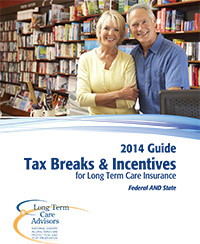Tax Breaks and Incentives
Recognizing that government can’t pay the bill for long-term care, federal and a growing number of state tax codes now offer tax incentives to encourage Americans to take personal responsibility for their future long-term care needs.
The Health Insurance Portability and Accountability Act of 1996 (HIPAA) included provisions for favorable tax treatment of qualified Long-Term Care insurance (LTCi) contracts.
Download our 2014 Tax Breaks and Incentives Guide which includes both State and Federal information.
Individual
- Premium payments to purchase qualified long-term care insurance by an individual – for yourself, your spouse, and your tax dependents (e.g. your children or dependent parents) are now included as a personal medical expenses if you itemize your taxes [IRC Sec. 213(a)].
- Medical expenses in excess of 10 % of your adjusted gross income are tax deductible.
- Below is a table of the amount of premiums qualifying as medical expenses for the 2014 and 2015 tax years. This is often referred to as the eligible long-term care premium.
| Attained age before the close of the taxable year | Amount of premium that counts as an allowable medical expense | |||||
| 2014 | 2015 | |||||
| 40 and younger | $ | 370 | $ | 380 | ||
| 41 – 50 | $ | 700 | $ | 710 | ||
| 51 – 60 | $ | 1,400 | $ | 1,430 | ||
| 61 – 70 | $ | 3,720 | $ | 3,800 | ||
| Older than 70 | $ | 4,660 | $ | 4,750 | ||
Source: IRS Revenue Procedure 2013-35 (2014 limits) and 2014-61 (2015 limits)
Self-Employed
Qualified long-term care insurance premiums may also be treated like health insurance for the self-employed tax deduction. Self-employed individuals may deduct 100% of the eligible long-term care premium shown above. The definition of self-employed includes sole proprietorships, partnerships, “greater than 2% shareholders” of S-corporations, or Limited Liability Corporations.
C-Corporations
Premium payments are fully (100%) deductible as a reasonable and necessary business expense- similar to traditional health and accident insurance premiums [IRC Sec. 213(d)1]. This can apply to the owners, their spouses and dependents, and all employees. Employer-paid long-term care insurance is excludable from the employee’s gross income and the benefits received are tax-free.
Partnerships, S-Corporations and Limited Liability Corporations (LLC)
Premium payments purchased for a partner or owner (2%+ shareholder) are subject to the same rules mentioned above for self-employed. Premium payments for non-partner/non-owner or less than 2% shareholder-employee are 100% deductible as a reasonable and necessary business expense — similar to traditional health and accident insurance premiums. Employer-paid long-term care insurance is excludable from the employee’s gross income and the benefits received are tax-free.
Long Term Care Advisors offers this information to help you better understand the various tax implications relating to LTCi policies. This information is provided for informational purposes only and should not be construed as tax advice. Please consult a tax advisor regarding your particular circumstances.
